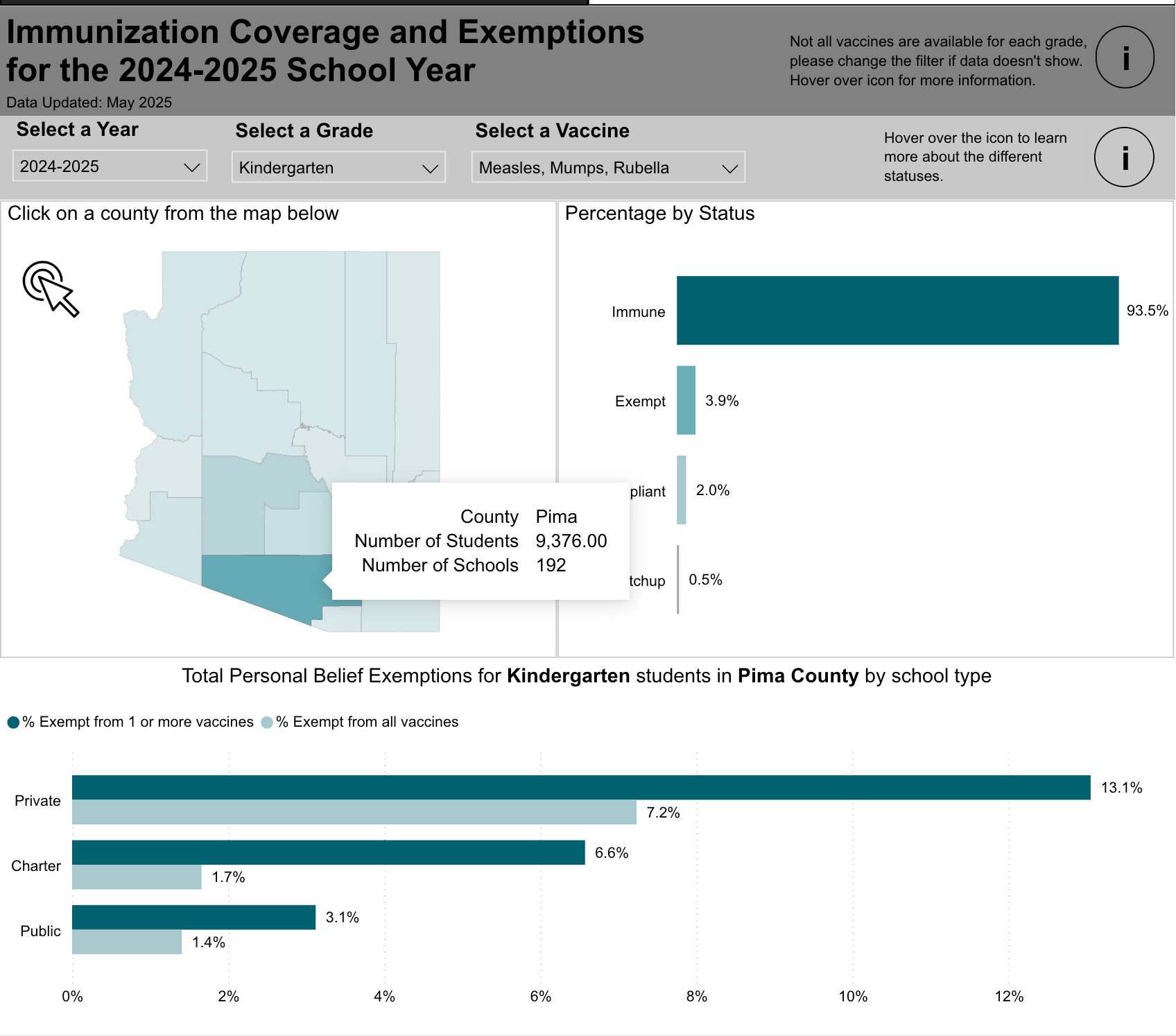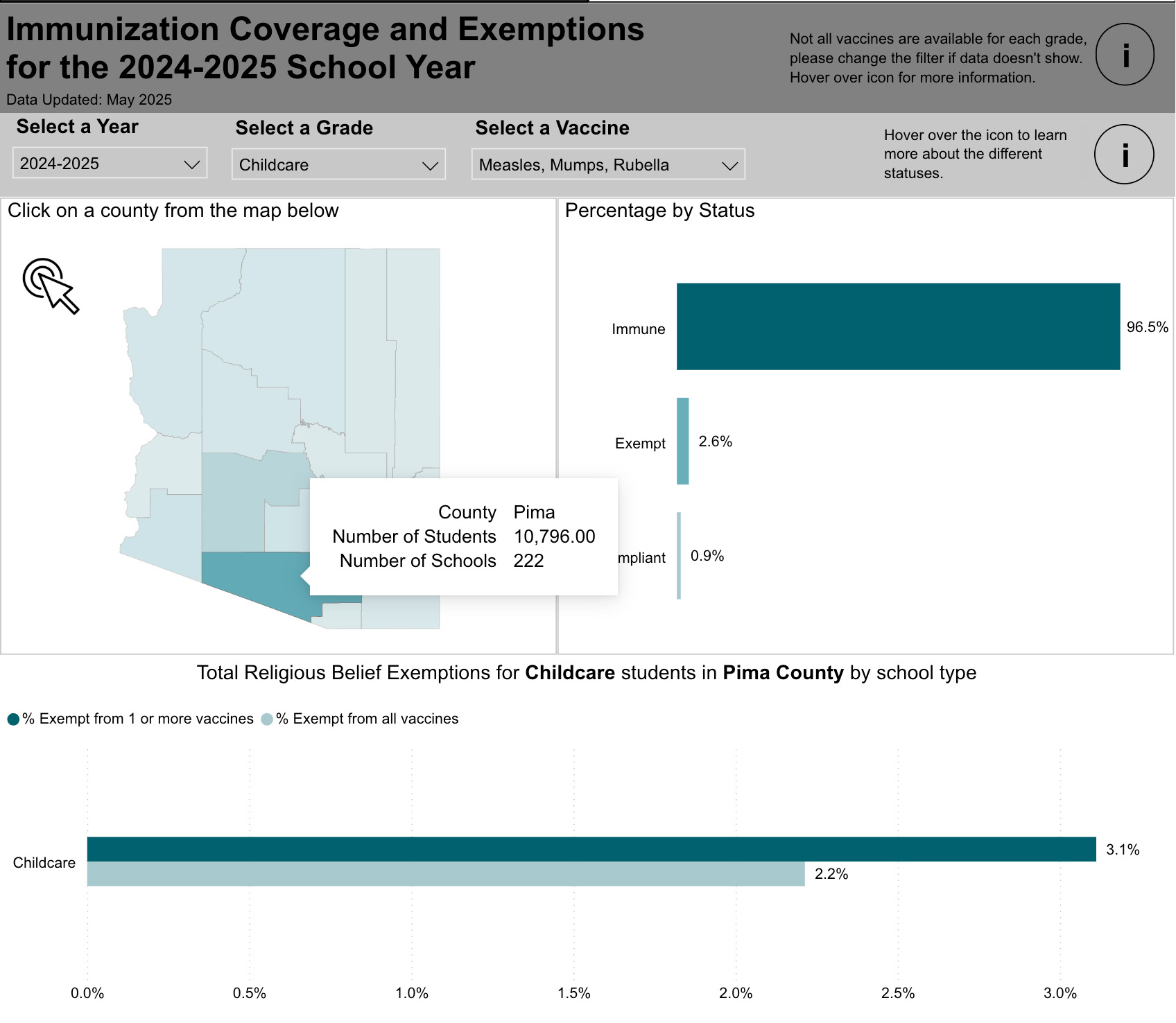 VIEW LARGER Immunization Coverage and Exemptions for the 2024-2025 School Year, Pima County Kindergarten data for Measles, Mumps, Rubella.
VIEW LARGER Immunization Coverage and Exemptions for the 2024-2025 School Year, Pima County Kindergarten data for Measles, Mumps, Rubella. Arizona schools have seen a decrease in children who are vaccinated.
The state, which allows people to opt for three kinds of exemptions for children: personal, medical, and religious, has seen an uptick in personal exemptions according to Dr. Theresa Cullen, who is the director of the Pima County Health Department.
“The increase in personal exemptions is of concern to public health and the reason for that is because once again, if all those exemptions added up, get above the 5%, speaking of measles, then you fall below your 95% rate,” Cullen said.
Pima County has a target rate of 95% vaccination in order to achieve and maintain herd immunity against measles, mumps and rubella.
A total of 156 schools in Pima County are below the 95% threshold, according to state data.
Although Arizona hasn’t seen any reported cases of measles– nationwide that is not the case.
According to the U.S. Centers for Disease Control and Prevention, there has been a total of 1088 confirmed cases across 33 jurisdictions. Arizona's neighbor to the west, California has had between 10 to 49 cases and to the east in New Mexico, between 50 to 99.
Cullen hopes that the personal exemptions are based on misinformation and a general lack of understanding about what public health is trying to achieve.
However, there is room for dialogue, for example regarding adverse effects to vaccines.
“They are very minimal and at least in Pima County and I believe in other counties, we track those,” Cullen said.
In March, the Pima County Board of Supervisors directed the health department to develop a plan to address schools and childcare locations with low rates of the MMR vaccination.
As a public health, back to school initiative, the health department will work with schools and childcare sites to schedule and deploy mobile vaccination clinics starting in July.
During Cullen’s presentation of the initiative on Tuesday, Supervisor and doctor Matt Heinz asked about federal recommendations that were questionable.
“Pima County Health Department is the public health authority for the county, the county can make decisions, recommendations that don’t have to align with what comes out federally,” Cullen said. “However, I think the only situation we will be in when we do something like that, will be after a strong reflection of the data.”
The Secretary of Health and Human Services, Robert F. Kennedy Jr. has held anti-vaccine views prior to his appointment and his mixed messaging regarding alternative treatment for the measles has been a concern for healthcare officials.
 VIEW LARGER Immunization Coverage and Exemptions for the 2024-2025 School Year, Pima County Childcare data for Measles, Mumps, Rubella.
VIEW LARGER Immunization Coverage and Exemptions for the 2024-2025 School Year, Pima County Childcare data for Measles, Mumps, Rubella. Supervisor Steve Christy followed up with the mistrust surrounding the COVID-19 vaccines, and asked Cullen to answer questions about the MMR vaccine to avoid the permeating mistrust that was experienced during the pandemic.
“Is MMR required by the state to take place before a child can be enrolled in a school, is that a requirement?” Christy asked.
“It is a requirement however there is the possibility for exemptions so a family can choose to document an exemption and all it is, is a parent or a guardian documenting a request for an exemption and that is accepted,” Cullen responded.
“But other than that, it is required?” Christy said.
“Yes,” Cullen said.
Christy asked about how schools could opt out of the voluntary mobile vaccination clinic program to which Cullen reiterated that it was an “opting in” program.
“What we’re seeing happening with vaccinations now is something that has happened throughout healthcare I would say in the last 10 to 15 years which is about shared decision making,” Cullen said.
The coronavirus pandemic strained public health systems across the world, revealing existing health disparities and disproportionate health outcomes among vulnerable communities.
In the case of measles, the disease was eliminated from the United States in 2000.
Vaccination has been proven to be an effective way to combat disease, and without it, more people are susceptible to getting sick. So why are individuals opting out of it?
This isn’t easy to answer.
Alex Schweig, professor of history at the University of Arizona thinks vaccine hesitancy has to do with a mistrust of authority.
“Studying the history of medicine you get two big things: one is the sort concern for the body, because this is where we live, right? Because we live in it and then also how power relations I think are always visible in epidemics,” Schweig said.
Schweig teaches a course titled, “History of Epidemics” and points to the unequal distribution of resources like vaccines and how the United States had more than needed compared to other countries as well as other resources like oxygen tanks.
“Something that is universal or nearly universal in epidemics in history is that there are always a lot of rumors and there’s like the production of knowledge because especially when it’s something that hasn’t been encountered before or hasn’t been encountered in the same magnitude or maybe even if it has but no one ever came up with a solution, I mean that inspires a lot of scrambling for ideas,” Schweig added.
An example of a politically infused rumor that came about during COVID was that it started from a Chinese chemical weapons lab, something that people still do not consider resolved.
“You can maybe compare this with rumors during the influenza pandemic in 1918-1919, at least on the side of the allies or entente powers– that it was a German biological weapon,” Schweig said.
The epidemic was also called the “Spanish Flu” despite the fact that the first cases were actually in Kansas, in a military base shortly after the U-S joined World War One.
Schweig mentioned that scapegoating is also a common occurrence during an epidemic.
As Cullen has said, the anti-vax movement has been happening for a while– the alleged link between the MMR vaccine and autism was proposed in the 1990s by Andrew Wakefield who published a paper in the medical journal, “The Lancet”.
“There has been miscommunication about the potential association between the measles vaccine and autism that has been disproven in what we call meta-analysis,” Cullen said. “I would really love to reassure people that that connection is not scientifically proven.”
Meta-analysis is defined by the National Library of Medicine as “the statistical analysis of a large collection of analysis results from individual studies for the purpose of integrating the findings.
Although Wakefield’s claims have been investigated and debunked– the discourse continues today.
“Vaccine hesitancy may have really blown up, at least in terms of the national debate and may have also gotten people to choose sides who weren’t choosing sides with COVID,” Schweig said.
Although historians cannot predict the future, Schweig believes that history can better inform the context of our current situation and refers to a quote by Mark Twain: “History doesn’t repeat itself, but it often rhymes.”
“I do not know what’s going to happen next, I hope that we and those who take our courses or just listen to us, that it can help them understand what’s going on and what might happen in maybe a more complex and more realistic kind of way,” Schweig said.

By submitting your comments, you hereby give AZPM the right to post your comments and potentially use them in any other form of media operated by this institution.